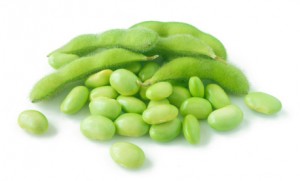Protein is vital to life – so vital, in fact, that every cell in your body need protein. Without adequate protein, we wouldn’t be able to grow, or to repair the everyday wear and tear that our muscles endure. Many body functions would be disrupted, too. Hormones, which act as €˜cellular messengers’ are proteins, and enzymes – which help the body perform many of the chemical reactions that occur inside of the cells – are also proteins. We need these specialized protein to keep the body functioning properly, so we need to get good quality protein, and the right amount of it, in our daily diet. All proteins are made up of €˜building blocks’ called amino acids. Many of these amino acids are essential – which means that our body cannot make them and so they must be supplied from the diet. When a protein contains all the essential amino acids, it is considered a complete protein. All animal sources of protein – meat, fish, poultry, eggs, and milk and milk products – are complete.
 Soy is unique – it is the only vegetarian source of complete protein, and the quality of soy protein is as good as animal sources of protein such as meat, eggs and milk. Since soy protein is derived from plants it contains naturally occurring phytonutrients – beneficial compounds from edible plants – that promote health. In the case of soy, these compounds are called isoflavones – which are found in other beans, too, but soybeans are the richest source. Soy protein comes in many forms, including soy milk, tofu, tempeh, fresh soybeans (edamame) and soy protein powder that can be mixed with milk or soy milk and fruit to create a protein shake.
Soy is unique – it is the only vegetarian source of complete protein, and the quality of soy protein is as good as animal sources of protein such as meat, eggs and milk. Since soy protein is derived from plants it contains naturally occurring phytonutrients – beneficial compounds from edible plants – that promote health. In the case of soy, these compounds are called isoflavones – which are found in other beans, too, but soybeans are the richest source. Soy protein comes in many forms, including soy milk, tofu, tempeh, fresh soybeans (edamame) and soy protein powder that can be mixed with milk or soy milk and fruit to create a protein shake.
Daily protein needs are different for different people. Men generally need more than women – they have larger bodies and more muscle mass to maintain. A general guideline is that men need somewhere in the range of 100 – 150 grams of protein a day, while women should aim for 75-100 grams. Those who are doing a lot of strength training to build more muscle might need to include a bit more.
Your body gets the most benefit from the protein you eat when you distribute your intake throughout your meals and snacks. In the morning, an egg white omelet, some cottage cheese with fruit, or a protein shake can all provide a good start to your day. If you include some meat, fish, poultry or plant proteins at lunch and dinner, and include some protein with your snacks – like a small carton of yogurt, some low fat cheese or a protein snack bar – you’ll likely hit your protein target. And, since you’ll be eating hunger- fighting protein throughout the day, you’ll be more satisfied – and less likely to stray from your diet plan.
Article by
Herbalife Nutrition Consultant
Susan Bowerman, MS, RD, CSSD,
is the Assistant Director of the UCLA Center for Human
Nutrition, a Registered Dietitian and a Board Certified
Specialist in Sports Dietetics.




